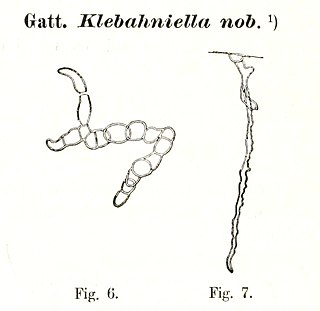
Gomontia is a genus of green algae, in the family Gomontiaceae.

Klebahniella is a genus of green algae in the family Chaetophoraceae.
Nayalia is a genus of green algae in the family Chaetophoraceae.
Setchellanthus caeruleus is a species of pungent shrub with large blue flowers. It is placed alone in the genus Setchellanthus, which is in turn, is placed alone in the family Setchellanthaceae. It is endemic to Mexico.
Santessonia is a genus of lichenized fungi in the family Caliciaceae. The genus was circumscribed in 1978 by lichenologists Mason Hale and Gernot Vobis, with Santessonia namibensis assigned as the type species, and at that time, only species. This species, endemic to the Namib Desert, has deep depressions (lacunae) in the thallus, which are interpreted as an adaptation to take advantage of the infrequent moisture provided by fog. The genus name honours Norwegian lichenologist Rolf Santesson.
Zimmermanniella is a genus of fungi in the family Phyllachoraceae. This is a monotypic genus, containing the single species Zimmermanniella trisporaHenn.
Combea is a genus of lichens in the family Opegraphaceae. It has two species. The genus was circumscribed by Italian botanist Giuseppe De Notaris in 1846.
Feigeana is a genus of lichenized fungi in the family Roccellaceae. A monotypic genus, it contains the single species Feigeana socotrana, first reported from Yemen in 1995.
Minksia is a genus of lichen-forming fungi of uncertain familial placement in the order Arthoniales. The genus was circumscribed by Swiss lichenologist Johannes Müller Argoviensis in 1882 with Minksia caesiella assigned as the type species.

Sigridea is a genus of lichenized fungi in the family Roccellaceae.
Streimannia is a genus of lichenized fungi in the family Roccellaceae. A monotypic genus, it contains the single species Streimannia varieseptata. The genus was circumscribed by Göran Thor in Opera Bot. vol.103 on page 84 in 1990.
Sachsia is a genus of fungi in the Ascomycota phylum and Saccharomycetales order. The relationship of this taxon to other taxa within the phylum is unknown, and it has not yet been placed with certainty into any class, order, or family.
The Lahmiales are an order of fungi in the Ascomycota, or sac fungi. The order has not been assigned to any class. The taxon is monotypic and contains a single family, the Lahmiaceae, which in turn contains the single genus Lahmia.
Duboscquella is a genus of dinoflagellates.
Koerberiella is a genus of lichenized fungi within the Lecideaceae family.
Poeltidea is a genus of lichenized fungi within the family Lecideaceae. It contains two species: Poeltidea perusta and Poeltidea inspersa.
Poeltinula is a genus of lichenized fungi in the family Rhizocarpaceae.

František Kotlaba was a Czech botanist and mycologist.
Otto Follmann was a German geologist, paleontologist and educator.

Siegfried Huneck was a German chemist and lichenologist. Much of his scientific career was hampered by the political situation in the former German Democratic Republic. He rejected pursuing a career in academia, and instead ended up working at the Leibniz Institute of Plant Biochemistry, a public research institute, from 1969 until his retirement in 1993. Despite his relative isolation and restricted freedoms in East Germany, Huneck had numerous professional contacts both in Germany and abroad, and was a highly published scholar. Many of his more than 400 scientific publications dealt with the chemistry of lichen products. He was awarded the Acharius Medal for lifetime achievements in lichenology in 1996.




